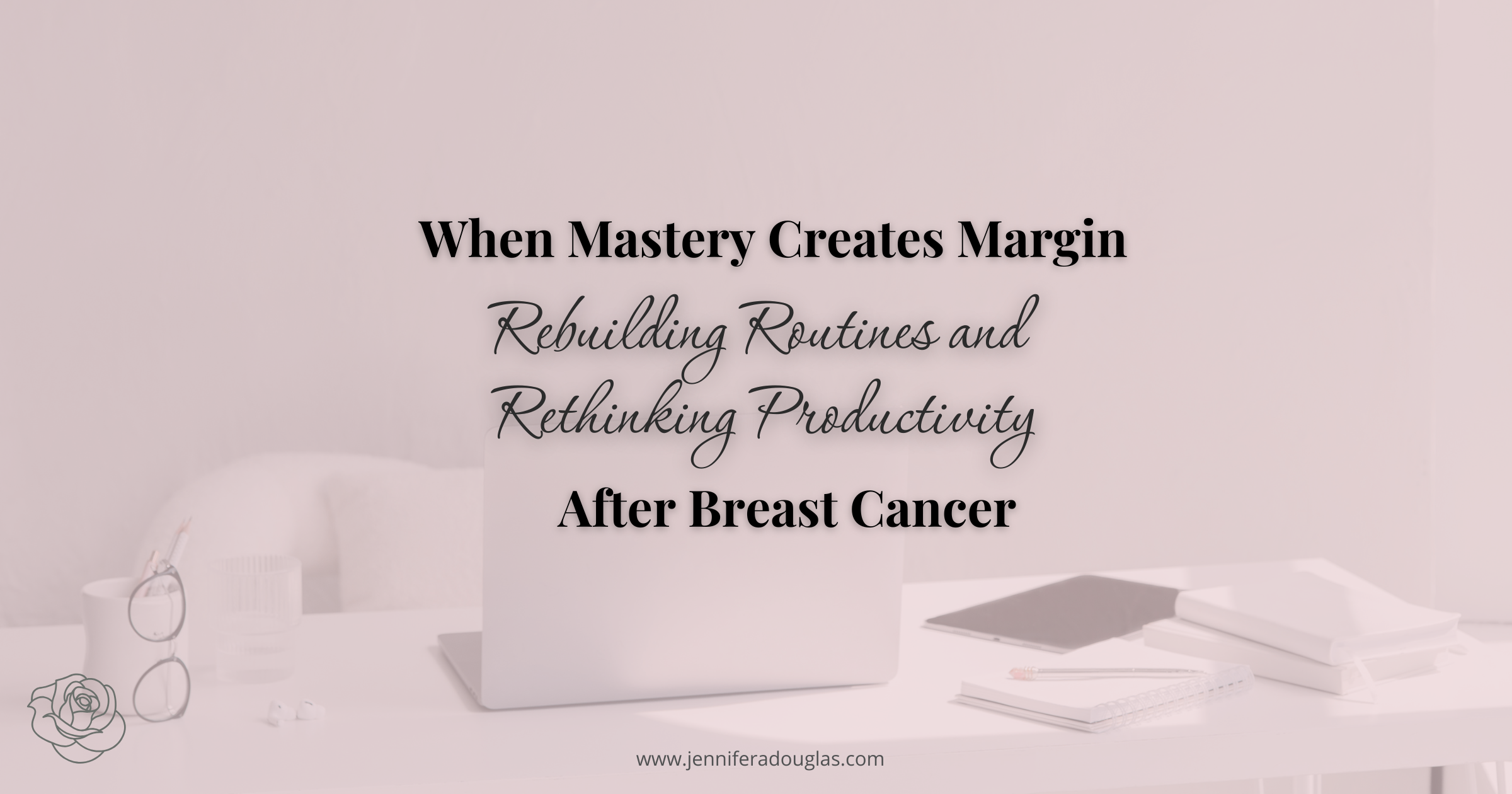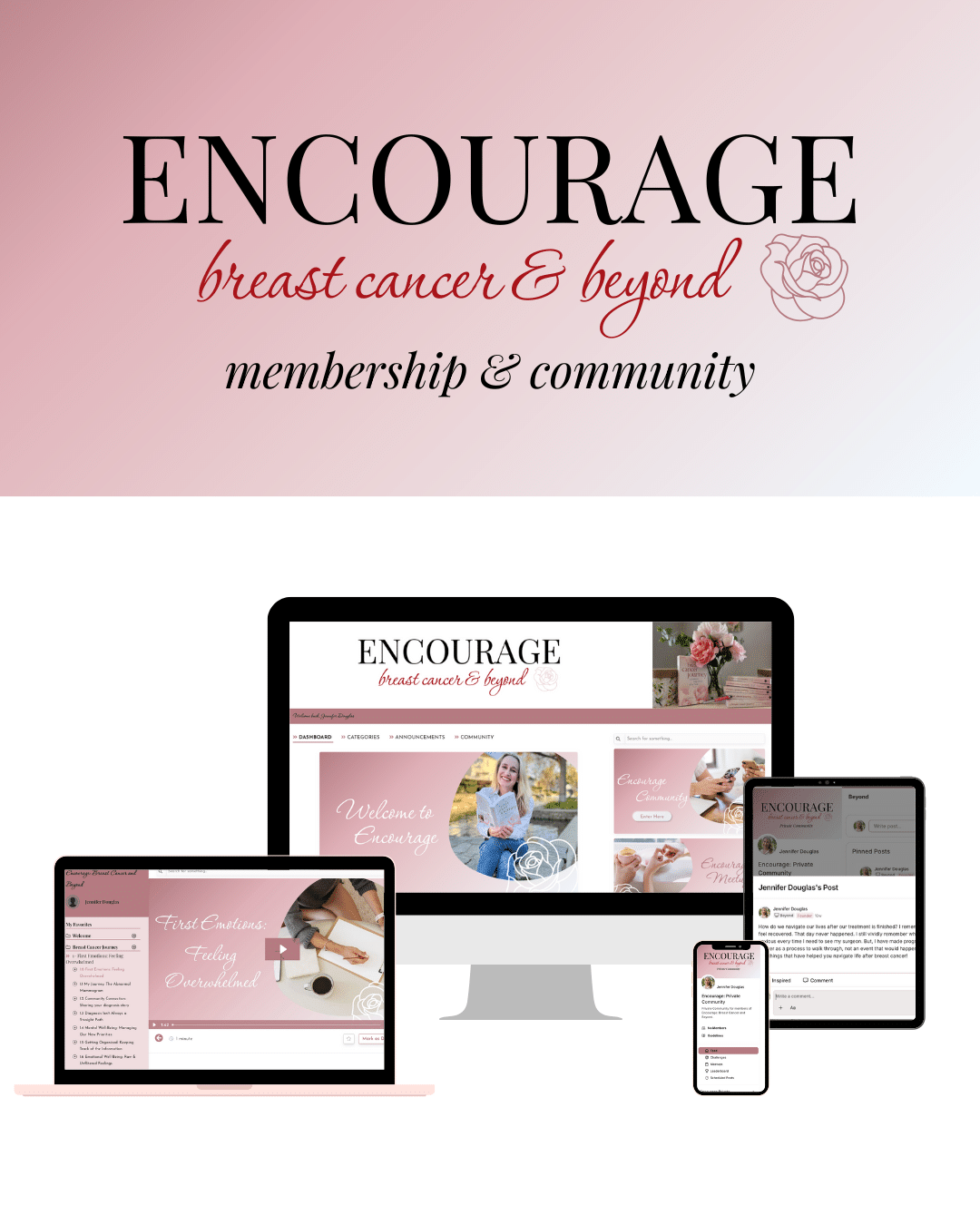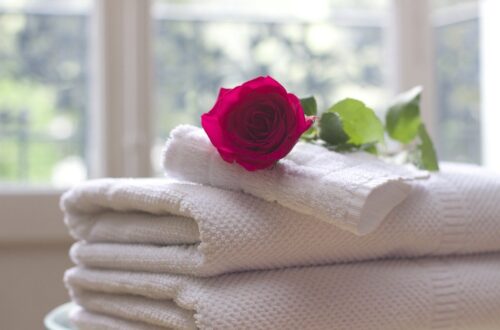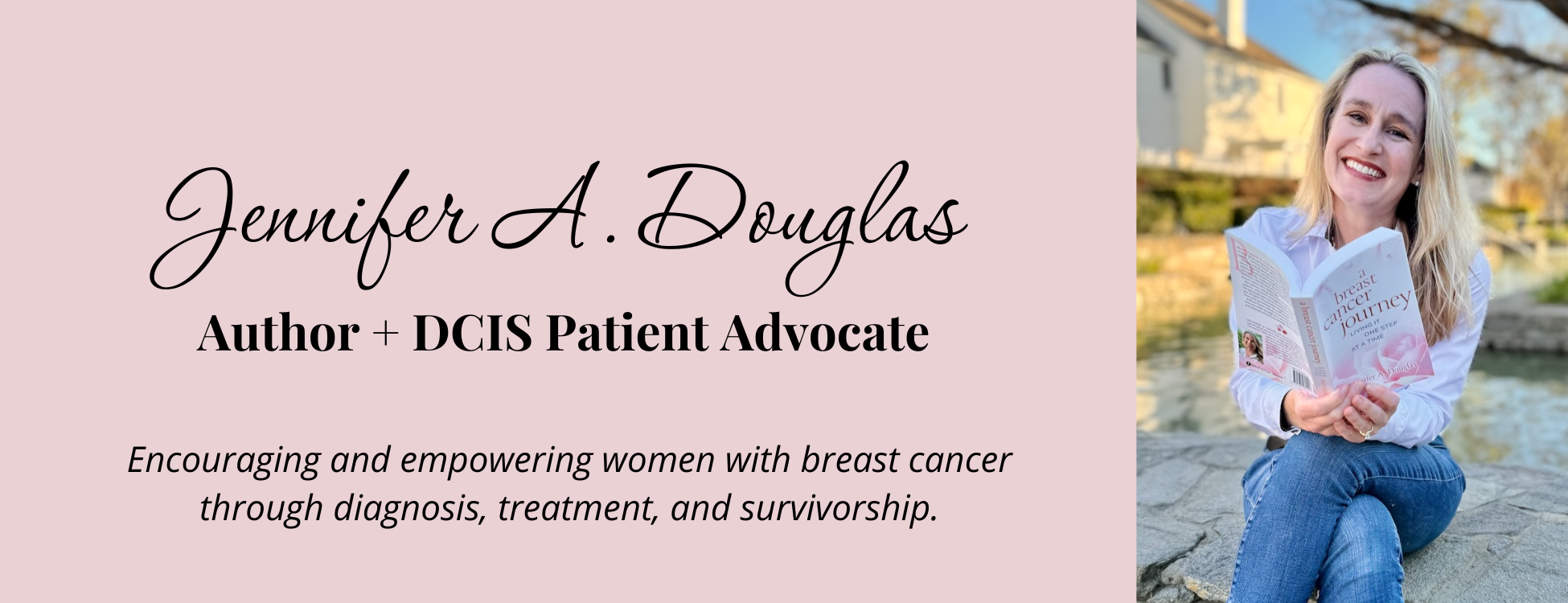
When Mastery Creates Margin: Rebuilding Routines and Rethinking Productivity After Breast Cancer
The laundry was going in the background. I had moved through most of my Sunday reset tasks when a thought popped into my head: Maybe I should add dusting off the patio furniture to the routine. Things are going so well—and it’s gotten easier. That seems like something I could easily do. Maybe it would be a better use of the time.
Then I stopped myself. Was the point of this reset to work nonstop until every corner of the house sparkled? Or was it to do just enough to feel like the home—and I—were ready for the week?
If I happen to get through all the tasks in a few hours with energy to spare, isn’t that something to be happy about?
So why was I trying to add even more “productivity” to a routine that was already working?
Are We Using Productivity as a Shield?
Why did I feel the need to keep going and add more? Was it because I needed to prove something to myself? Is my reset routine somehow worth less because it felt calm and easy?
Laundry has been hard for me for as long as I can remember. It’s the one thing I’ve always loved to complain about. I never had a routine that really worked, so it became this ongoing chore I could talk about hating. It was a part of home life I felt oddly comfortable not having under control.
But ever since I started my Sunday reset routine, I can’t really complain about laundry anymore, because it’s all getting done. And, surprisingly, I’ve found a way to make it easy.
After decades of being a self-declared laundry hater, I’ve somehow mastered the family laundry. It doesn’t nag at me anymore.
It’s strange to walk into the laundry room and not see chaos. For years, there was always something—a load that had been in the dryer too long, a basket of clothes waiting to be folded and put away, or a mix of clean and dirty laundry I hadn’t sorted yet. Sometimes I had three or four loads waiting, which always felt like too much to tackle in one sitting.
Now, on Sundays, I fold things one load at a time—and it’s no big deal.
But if I’m honest, it feels a little unsettling to have finally mastered laundry.
It’s such a simple task, and it never really ends. Laundry is one of those treadmill chores—always there, always waiting. But this year, I’ve found a system that actually works for me.
And that brings up a new question: Is there something uncomfortable about things feeling easy?
Because now we’re getting to something worth digging into.
Mastery Creates Margin
In college, I studied music education alongside flute performance. What I loved about both specializations was the balance they offered. On the music education side, I had the chance to learn and teach multiple instruments. On the performance side, I got to focus on what it meant to become an expert on just one.
My flute teacher was a prominent studio musician. For decades, he made a living by playing things perfectly the first time through. Studio musicians were expected to sight-read—a skill that meant reading a new piece of music for the very first time and playing it well immediately.
So, he taught me how to do just that. We spent hours learning how to play pieces right the first time. Of course, we’d go back and work on the details later—especially when I was preparing for a recital—but the goal was always clear: be great the first time through.
I could do that on the flute because I had spent years practicing it. I had the experience, the technique, and the comfort level to play with ease—often without needing hours of preparation.
But hand me an oboe and expect the same result? Not a chance. I had to work just to play basic scales. Mastery, I learned, is built through repetition and familiarity—and without that, everything feels harder.
As I sat on the couch, contemplating whether to add one more thing to my Sunday reset list, I realized something important: the only reason I had the margin to even consider it was because I had been practicing this routine for months. I had started to master it. And with that mastery came space.
Some of my daily routines feel this easy too, but only because I’ve kept practicing and refining them. Weekly routines have been trickier. I think part of that has to do with the changing dynamics of our family, my fluctuating energy levels, and my limited bandwidth to really focus on something like laundry. It was never a priority. Instead of solving the problem, I got comfortable complaining about it.
I remember there were times in lessons when I’d hit a tricky passage in a piece. My teacher would pause and ask if I had taken time to practice that one little section over and over again. Most of the time, I hadn’t. It wasn’t the fun part, so I avoided it.
The trouble was, by the time I arrived at the lesson, I had already learned it wrong. I kept playing the same mistakes because I had unknowingly practiced them into my muscle memory.
Unlearning was always harder.
And in some ways, I’ve been unlearning my laundry procrastination for several months now. It feels strange—but also really satisfying—to no longer see laundry as a problem.
As I’ve been practicing the same Sunday reset with the same list for months, that repetition has created more mastery—and with it, new margin.

Looking for more Encouragement?
Inside Encourage: Breast Cancer & Beyond, a private membership community, you can join me on calls where we can talk about how to find sustainable rhythms after our treatment ends.
Membership includes:
- Access to “A Breast Cancer Journey” Online Course
- Private community
- Regular Zoom Support Calls
So What Do We Do With the Margin?
The last few years have been filled with so much that I almost don’t know what to do with the margin. It has been a swirl of family changes, a global pandemic, health challenges, career opportunities—and not much space in between. It has felt like we were running from one crisis to another.
As things have quieted down, I’ve been seeing peace and space again. There’s a hint of margin. Time to figure out what rhythms make sense for me now. And as I’m figuring that out, I can feel a familiar pull—to keep doing, to keep pressing on, to keep adding more. But what if what I really need right now is the margin?
I haven’t been able to write as much on the blog over the past few years. Writing takes time. It requires space to think, to make connections, and to listen to my thoughts. When I’m running from one thing to another and everything feels hard, there’s no time for that kind of creativity. Without margin, everything starts to feel like a crisis.
In many ways, the piles of laundry have mirrored the piles of problems in my life. And the truth is, the laundry wasn’t the most important thing. It could wait while we sorted out what really mattered.
But the swirl has settled—for now—and I’m finding time again. As I sat on the couch recently, playing some Disney Emoji and waiting for the next laundry beep, I caught myself thinking about how to be more productive. Then I stopped. I was being productive. The laundry was going. That was all I really needed to do at that moment. Until the next timer went off, I could rest. I could enjoy the margin.
But would I? Would I let myself relax? Or would I fill the time up because the quiet felt uncomfortable?
When we’ve mastered something, what do we do with the extra time it gives us? If I can play a piece on my flute well the first time through, do I still need to spend an hour practicing it?
Sometimes, when we were homeschooling, my boys would breeze through their math lesson. They didn’t need to spend a full hour on something they already understood. And since we were doing school at home, there was no need to fill time just to fill it. They got that time back—and could use it however they wanted. Other days, the lesson was more complicated, and we needed more time to learn it. That was okay too.
I began to realize that, in some ways, what I’ve been doing with the Sunday reset is similar. I’ve been practicing this weekly rhythm for a while now, and I’ve started to master it. I don’t need to add more to it. It’s enough—just like one math lesson was enough for the day.
Some Sundays, I end up with more time to relax. Other Sundays, I have a few more loads of laundry to do. But the real question is: when I do have the extra time, what will I choose to do with it?
Remaking and Remastering Our Routines After Breast Cancer
During breast cancer treatment, nothing feels normal—not even our regular routines. We’re focused on appointments, treatment decisions, managing side effects, and simply getting through each day. The last thing on our minds is regular meal planning or optimizing how our week flows. Survival becomes the priority, not structure.
And then treatment ends. Now what? Do we pick up our old routines just as they were? Or do we remake them?
I’ve written before about energy management in a post on “either-or” energy after breast cancer, and I think it weaves in beautifully here. I’m slowly finding a new rhythm—one that fits the life I’m living now. Not the life I had before diagnosis, but the one that has emerged after.
And I want to encourage you: it is possible to rediscover peace and ease again after breast cancer. You may not do things in the same way, or with the same cadence as before—and that’s okay.
Maybe your energy is better spent ordering groceries online rather than walking the aisles of a store. We often underestimate the benefit of finding a way that works for us—and sticking with it. When we master a routine and it becomes second nature, we create margin. We make space for creativity. We begin to find moments to breathe again.
I thought about this recently as I sat outside with Dave, enjoying a quiet Sunday evening and the long stretch of a summer sunset. That moment of peace felt good—but also unfamiliar. After living in crisis mode for so long, peace can feel almost unsettling.
Still, I’m learning to resist the urge to add more just for the sake of feeling productive. Just because we’ve mastered something doesn’t mean we’re obligated to add more to it. If the work is done, does it matter how long it took? Is it somehow more valuable if we stressed ourselves or added extra steps?
Or—can it simply be easy?
Jennifer Douglas
Jennifer Douglas is an author, patient advocate, and DCIS breast cancer survivor. After navigating her own breast cancer journey in 2019, she began writing and encouraging others who were newly diagnosed. Her resources include her book, "A Breast Cancer Journey: Living It One Step at a Time," and her online support course, "Encourage: Breast Cancer and Beyond." Jennifer also actively supports patients through her online presence and direct involvement in communities and support groups, offering guidance and encouragement every step of the way.

You May Also Like

Tackle Your Hated Chores
October 30, 2020
How to Establish a Weekly Cleaning Routine
November 20, 2020
